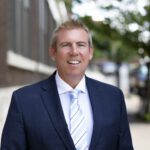
[Editor’s Note: As two major media outlets announced plans to bolster climate change coverage, we asked Jeff Lambert, chairman of Michigan-based PR and investor relations firm Lambert Global, how companies should react. His initial advice is to make sure you’re actually doing good environmental work before you begin talking about it. We also asked Lambert about investor relations trends and the challenges of corporate citizenship, especially when senior executives are taking stands on issues that put them at odds with their companies.
In addition, we asked about the workings of PROI Worldwide, the global alliance of some 80 independent PR firms in 55 countries. Lambert is PROI’s global chair-elect. His remarks were lightly edited.]
PRN: What are two trends investor relations executives are watching at this time?

Jeff Lambert: The rise of the retail investor. This individual or retail investor is now 30 percent of trading value. Five years ago, they were in the low teens. They now have much more influence. Their numbers are up because of online investing and free trading.
The other trend is ESG and corporate citizenship. It’s no longer just your investment profile but your citizenship profile. That’s definitely driving investment decisions, from the largest institutions to the smallest investors.
PRN: That leads to our next question. We’ve seen media outlets announcing they’re adding reporters for climate change. What does this mean for ESG? How are you counseling companies on this?
Lambert: Our first advice is to look internally and say, What are you doing to be more sustainable and address these things? So, don’t focus on what you can talk about until you’ve taken care of the home front.
And either through employee resource groups or councils or initiatives, certainly expand [your environmental activities] and address these types of things.
Also, consider the range of coverage of [these new] reporters. It’s not just environmental sustainability or climate [they’ll cover]. They’re also grouping in things like electrification and EV (electronic vehicles).
Then, look globally. See what environmental issues there are outside of your country and what drives them.
So, overall, look at the full breadth of their potential coverage and don’t think too narrowly.
PRNEWS: Turning to PROI, are communicators in other countries doing things about sustainability and environmental issues that PR pros here should learn from?
Lambert: Absolutely. I’d point to our current global chair, Ciro Dias Reis in Brazil. They are very involved in climate issues. Germany is very advanced, too. Then there also are countries that are not on the radar screen.
That’s one of the biggest challenges with a global agency. The topics vary by country.
For example, diversity is one of the top issues facing corporate America, but it’s not an issue being tackled…around the world. It’s ironic that the PROI organization is the most diverse group I’ve ever been part of…yet diversity is a topic we don’t spend any time talking about, as opposed to what we do in the Americas.
So, you have to realize something’s that’s a big issue in your country may not be as big for a client in another country.
PRN: Some small families can’t get along. How does PROI manage 7,000 employees from 80+ companies in 55 countries and 165 cities?
Lambert: We mandate participation from the founder or owner or CEO or senior-most member of the agency. This immediately creates a partnership of peers. That instills trust, a relationship and a mutually beneficial arrangement.
How that works is we get together, we build relationships and share best practices.
Another aspect that’s made us successful is how we [onboard] new members. We talk about how joining PROI and giving and contributing to the partnership and you will definitely get much more. But it’s that spirit of collaboration and investment in the partnership. And we don’t spend a ton of time on addressing Well, I’m joining the partnership. What’s in it for me?
That spirit of true partnership is why we share confidential information and go to market together and sometimes we acquire each other. There’s a degree of trust that occurs because of that model.
PRN: You are the newly elected global chair of PROI. What do you see as your top priorities when your two-year term begins in June?
Lambert: My main message is to elevate the ROI in PROI, for each agency, our teams and our clients. I look at this in three areas. Creating agencies of the future together. So, look at innovation and our global talent base and say, what does the agency look like in the future? How do we each participate in that?
Second, deepen our partnership by moving beyond PR and communication best practices to share business expertise and leadership.
And how do we want our agencies to attract and retain people? Continuing our brand-building momentum so that prospects and clients know what to expect in that PROI is a resource for them if they go cross-border, we can go with them.
PRN: How does PROI operate? Do you have regular meetings?
Lambert: It’s a collection of usually the largest independents in a country or a category. We pursue cross-border business together. We can also stand up [an arrangement] to respond to an issue. So, Covid was a great example. We were able to help companies in 10 different countries in the span of a few hours because of the partnership.
So, there are shared clients and shared best practices. We talk about it as a partnership versus a network. So, [with] a partnership we have that peer-to-peer knowledge-sharing, pushing that into the organization. We have learning sessions available to all. We have a global summit where everyone from the world comes together. Last year it was virtual, but this year it’s in-person.
We also are broken into three regions, EMEA (Europe, Middle East, Africa), APAC (Asia Pacific) and the Americas. Each region has regular meetings and a summit. So, it tends to be quite active in regular communication and partnering.
We also have an exchange program. So, we have staff apply to work in another agency around the globe. We’ve sent people from Michigan to London, South Africa, Germany, Singapore. The reciprocity of not just learning over the phone but living with that team [in-country] has been essential for growth and talent attraction.
PRN: Before COVID, was PROI more of a phone experience or were you using video-conferencing?
Lambert: We used video-conferencing for more meetings. However, we were in-person for our regional meetings and for our global summit, which is five days. It rotates between regions. So, it was in Portugal before Covid. Our next one is in May, in Croatia and it will be in-person. It’s irreplaceable the ability to interact before a session, during a session, after a session. That’s what makes PROI special, the relationships.
I’ve been to [PROI members’] homes. I know people who’ve hosted each other’s kids, It’s truly a unique partnership of agencies.
PRN: What’s one lesson you’ve learned from PROI that you’ve found most valuable?
Lambert: How small and similar the world is that we live in. The practice of PR and communication and investor relations is starkly similar. And that’s very encouraging. It makes the world seem much more functional.
But there also are nuances and learnings I never would have gotten without my international partners. It’s been transformational for me as a leader and for leadership of my teams.
PRN: What’s your view at this moment when we see companies taking a position on a social or political issue and then lobbyists donating money as private citizens against those positions? Or when you have corporate leaders taking stands, again as private citizens, that run counter to the company’s position?
Lambert: Certainly, we advise our clients to deliver on their promises. Shortly after George Floyd was murdered, we received a lot of calls from people asking what their response should be. My answer was always, ‘act.’ And then you can talk about it. Generally, actions speak louder than words. That’s the first advice.
On muzzling employees, that’s not going to be a big talent attraction. It’s always going to be a challenging situation.
However, there’s a difference between leaders and staff. Leaders are held to a higher standard because they are the voice and the mouthpiece for the organization, which includes PR professionals. There has to be a different standard. You can’t take a public position that is different from the company unless you’d like to leave that company. If you feel the organization you work for is doing things incorrectly you should take a stand and leave. Anything else is fraught with issues.
